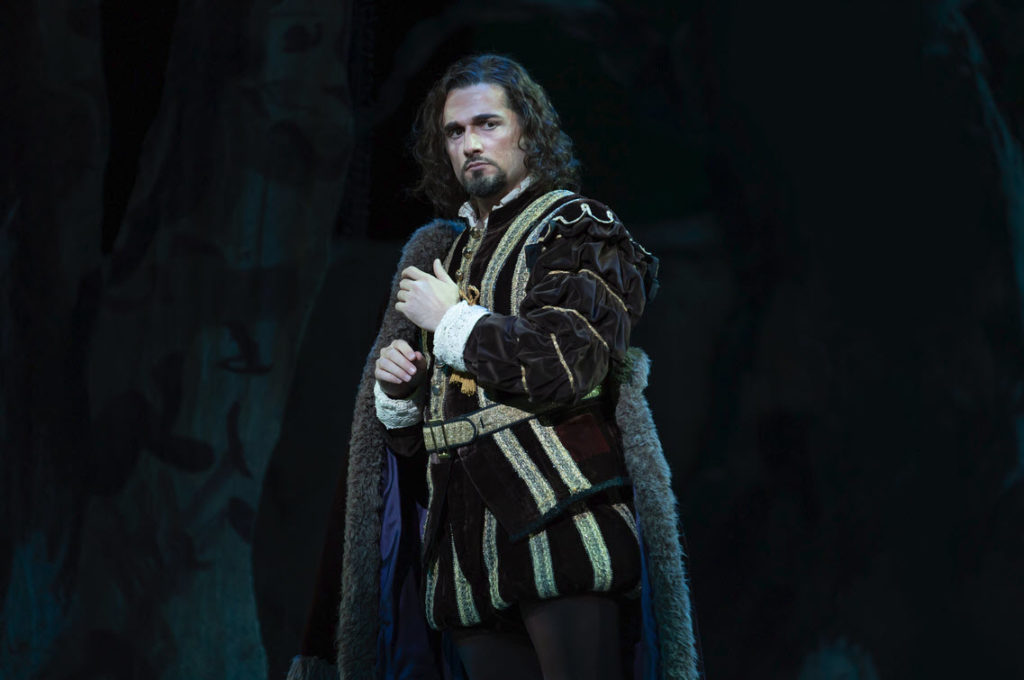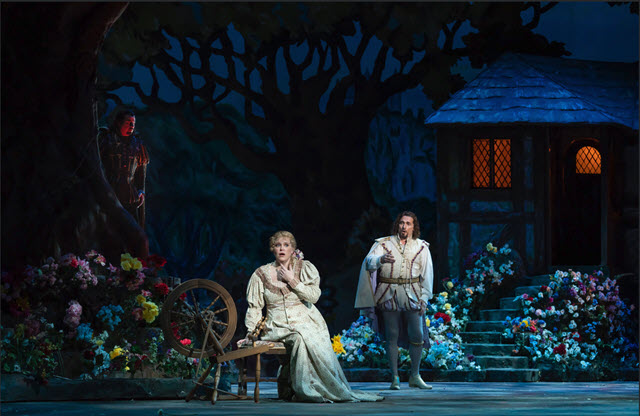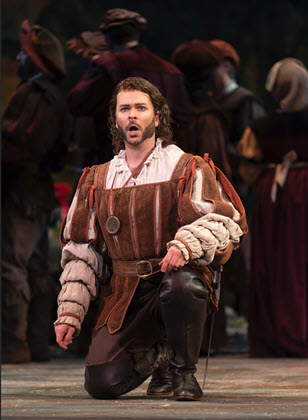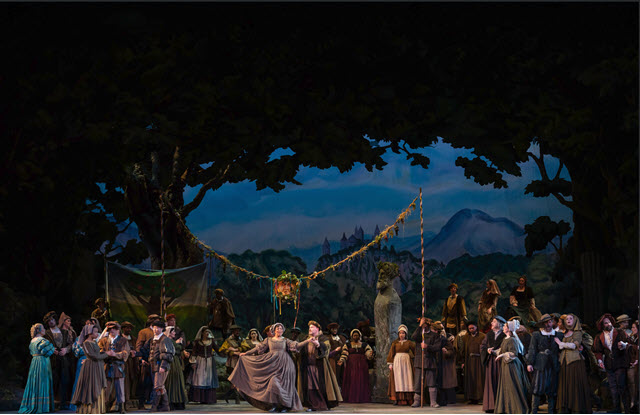Jordan Wright
March 19, 2019
Under the direction of Garnett Bruce, Faust becomes idyllically condensed. You didn’t really expect the 21-hour, five-act version, did you? This one is three and a half hours with two 20-minute intermissions between acts. Premiering in 1859, Charles Gounod’s opera debuted in the Théâtre Lyrique in Paris. It derives from Goethe’s story of the man who sold his soul to the devil in exchange for the supernatural powers that would give him love and youth. As for Méphistophèlés, he was all too thrilled to grant him the ultimate wish on the condition he serve him in Hell. Unbeknownst to our soul-seller, Satan is determined to make it a two-fer.

Cursed by her brother, Marguerite (soprano Erin Wall) prays for forgiveness after his death. Photo credit Scott Suchman
First, he lures in Faust, then he takes his beloved Marguerite in the bargain. It was an easy plan as Marguerite’s brother, Valentin, goes off to war, and can no longer protect her virtue.

Faust (tenor Marcelo Puente) makes a deal with the devil for wealth and beauty. Photo credit Scott Suchman
Audiences loved it. It dovetailed neatly into their fondness for Byron and Shakespeare and was the just right fit for the ‘boulevard’ theaters of the 19th century Romantic period. Though these moralistic productions were considered ‘low-brow’ recreation, the excitement of witnessing stage magic, then called, ‘phantasmagoria’, was as addictive as the schadenfreude of seeing a fallen woman get her comeuppance.

Mephistopheles (bass Raymond Aceto) predicts Marthe’s (mezzo-soprano Deborah Nansteel) future. Photo credit Scott Suchman.
Gounod’s opera blends inspired elements of comedy, tragedy, and passion with a hefty dose of evil incarnate. Comedy first arrives when, as the despondent Faust is about to end his loveless life with a chalice of poison, Satan appears in a fitted doublet and feathered hat looking like Sir Walter Raleigh and says to Faust, “Is my attire not to your taste?”. Doctor Faust, dressed in a manner befitting Copernicus, doubts his powers given his natty attire. Not the sort of challenge one should present to the Devil himself. Ah, well, Faust accepts the terms and the deal is on.

The devil (Raymond Aceto) looks on as Faust (Marcelo Puente) woos Marguerite (Erin Wall). Photo credit Scott Suchman.
There are many exceptional arias – the one between Faust and Marguerite is legendary. It’s the moment when she decides he really, really loves her by plucking the petals off a flower – as in ‘He loves me. He loves me not.’ That’s conveniently after she discovers the casket of lavish jewels he has gifted to her. After Satan’s urging to be more manly in his love-making, ‘Avant de quitter ces lieux’ marks the moment when she accepts his love. Here is where she loses her moral compass. Diamonds can do that to a girl. You could be blindfolded and skip the projected English surtitles, and still hear how Goudnod’s music reflects the disparate emotions throughout the libretto. Gounod was a pioneer in these reminiscence motifs and later composers borrowed his techniques.

Valetin (baritone Joshua Hopkins), a young soldier, prepares for war and hopes God will protect his sister during his absence. Photo credit Scott Suchman
Earl Staley’s gorgeous scenic design and costumes are storybook perfect. From Faust’s study bathed in red to the villagers celebrating harvest time at a fair with a vignette of Adam and Eve, a juggling Pulchinello, giant masks on stakes, and acrobats tumbling across the stage cheer on the soldiers as they go off to war. Later an evocative garden scene beside Marguerite’s Tudor cottage windows becomes golden-lit by the glowing hearth as the season changes and snow falls. In the end when Marguerite faces her Maker to beg for forgiveness for her wanton and murderous ways, the stage becomes a massive church, Chartres-blue and featuring a massive cross. If that wouldn’t put the fear of God in audiences back in the day, what else would?

The townspeople rejoice with wine and dance celebrations. Photo credit Scott Suchman
Utterly magical and highly recommended.
Featuring Marcelo Puente as Faust; Erin Wall as Marguerite; Raymond Aceto as Méphistophèlés; Samson McCrady as Wagner; Joshua Hopkins as Valentin; Allegra De Vita as Siébel and Deborah Nansteel as Dame Marthe. With The Washington National Opera Chorus and Supernumeraries.
Libretto by Jules Barbier and Michel Carré. The Washington National Opera Orchestra conducted by Keri-Lynn Wilson; and Lighting Design by Michael Clark.
Performances are on March 22nd, 24th matinee, 27th and 30th 2019.
Faust Related Programs and Events
Opera Insights before every performance, Kennedy Center Opera House
WNO presents a free pre-performance education event prior to every performance of Faust. These events begin one hour prior to curtain in the Opera House and last approximately 20–25 minutes. Musicologist Saul Lilienstein’s Opera Insights on Monday, March 18, begins at 5:45 p.m. and lasts approximately 35-40 minutes.
Musical Preview of Faust and Eugene Onegin
Wednesday, March 6, 2019 at 6 p.m., Kennedy Center Millennium Stage
Enjoy a free preview of musical highlights from two of opera’s grandest works: Tchaikovsky’s Eugene Onegin and Gounod’s Faust, running concurrently this March. This special program features the vocal talents of WNO’s Domingo-Cafritz Young Artist Program performing each opera’s most famous works.
Guided Rehearsal: Faust
Friday, March 8, 2019 at 7 p.m., Kennedy Center Opera House
Explore the Arts. Audience members get a behind-the-scenes glimpse of a world-class opera production through this unique open rehearsal experience. Using audio headsets, attendees can learn more about the production via expert commentary while watching a rehearsal with piano and the professional cast. Visit the WNO website for ticket information.
Artist Q&As: Faust
Monday, March 18, and Sunday, March 24, post-performance, Kennedy Center Opera House
Following the performances on Monday, March 18 and Sunday, March 24 in the Kennedy Center Opera House, please join WNO artistic staff for a wide-ranging discussion with the artists for an inside scoop on the production. These events are free to patrons presenting a Faust ticket and begin immediately after the performance.
“Touch Cart” and Audience Experience
Friday, March 22, and Wednesday, March 27, pre-performance, Kennedy Center Grand Foyer
WNO’s Touch Cart will be open one hour prior to the performances on Friday, March 22 and Wednesday, March 27 to experience first-hand real props and costume items featured in the opera. WNO’s Education Department invites patrons to come early to touch and explore items from the production.